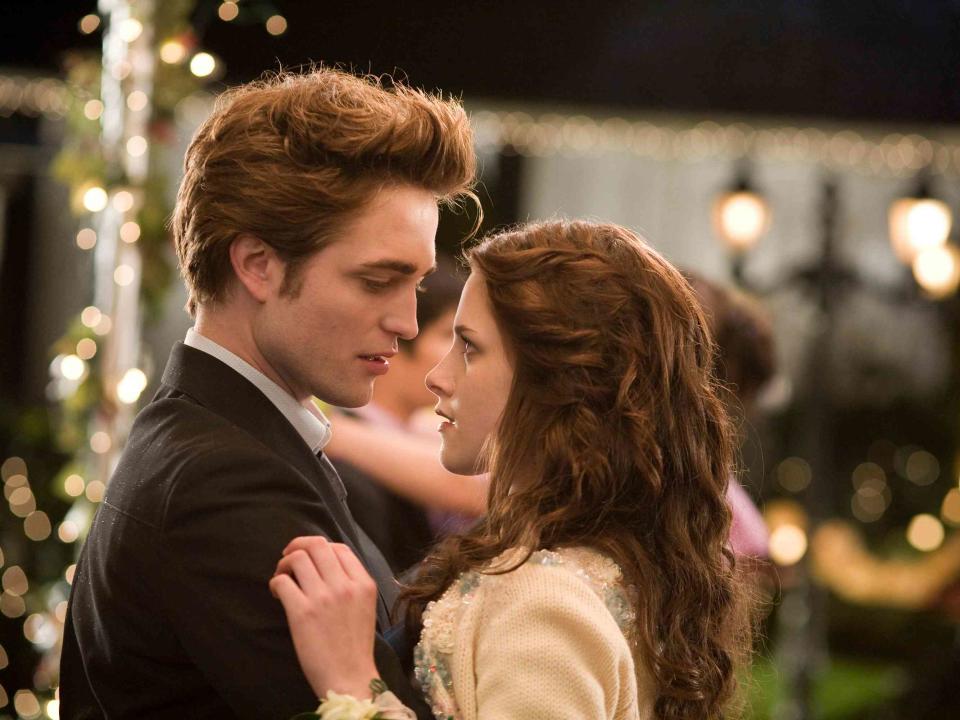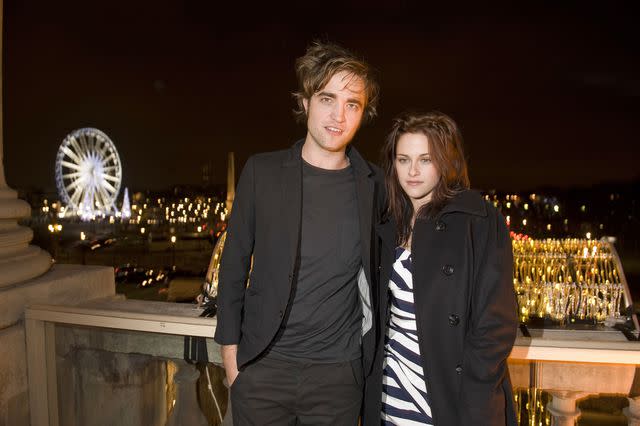It's Been 15 Years Since the Premiere of ‘Twilight’ — And the Film Is Still Good for My Mental Health
- Oops!Something went wrong.Please try again later.
The cult-classic movie turns 15 today, and I’m revisiting the positive impact it had on my life after being diagnosed with OCD.

Alamy
The year was 2008. It was a brisk (probably rainy) fall in Western Pennsylvania. I had just transferred schools during the most awkward time of my life. I was 11-years-old, entering the 6th grade, and on top of any run-of-the-mill teenage angst, I had recently been diagnosed with anxiety and Obsessive Compulsive Disorder (OCD). Great. I was the new kid with borderline-debilitating internal struggles, including depression, intrusive thoughts, guilt, and germaphobia. To outsiders, I probably seemed like your average tween (I was more of a suffer-in-silence type), but on the inside, I was constantly worrying about going to hell for having a sexual thought or killing my whole family if I didn’t wash my hands thoroughly enough. Then, 15 years ago, the first Twilight movie premiered, and guilt surrounding my sexuality subsided and thoughts of killing were reserved for the vampires.
The z-illenial vampire romance book series had already garnered worldwide popularity by the mid-2000s. But given my aversion to recreational reading at the time, I didn’t dare pick up a nearly 500-page tome. Still, when my older sister, Tara, suggested we watch the movie on DVD, I was happy to spend a wintery Saturday night cozied up in our living room with her and our mom. She had seen the flick in theaters with her cool, older friends, and promised I would love it. I obliged, open to any and all diversions from my illness.
Turns out, we weren’t the only teenage girls eager to escape into the fantasy. The film, starring Robert Pattinson and Kristen Stewart, premiered on Nov. 21, 2008, and, though shot on a budget of just $37 million, went on to earn $408.4 million at the international box office, and catapulted the young stars to fame seemingly overnight. It became a cultural phenomenon, spurring the creation of Edward and Bella Barbie dolls, makeup lines, and hilarious internet memes for years to come (see: Where the hell have you been, Loca?), eventually cementing its permanent placement in the zeitgeist.
At first, I wasn’t impressed. I initially scoffed at my sister for liking the campy, soapy movie (recall the bad wigs, editing snafus, and, not least, unrealistic plot). Tara played the film on repeat, subjecting me to the movie at least two more times (once during a long car ride). It started to grow on me. Before long, I became invested in the lives of Bella and Edward and their fantastical love story. It was an opportunity to disappear into the mystical world of Forks and leave behind my own aforementioned problems.

Getty Images
Robert Pattinson and Kristen Stewart, who played Edward and Bella in the films.Related: There's a 'Twilight' TV Series Coming Your Way
I decided to sink my teeth into the books, and was hooked almost instantly. Even though I had already seen the first movie numerous times, I could not put the novels down. I spent full weekends reading. I brought the books everywhere — school, friends’ houses, musical theater rehearsal, the grocery store, church — so I could flip open the pages at any given moment and be transported into a world of bloodsuckers and werewolves with eight-pack abs (hi, Taylor Lautner). My 13th birthday party consisted of taking a group of friends to see New Moon in theaters while wearing an outfit built around my trendy Team Edward tee from the Nordstrom junior Twilight collection (far superior to the cheesy Hot Topic merch, IMO).
It was a relief to have something that quieted my mind. My Twilight obsession (OCD pun intended) distracted me from my incessant intrusive thoughts, guilt, and anxiety. I became fixated on Twilight rather than the germs on my hands or thoughts of eternal damnation. At the time, I didn’t understand how or why the broody, teeny-bopper romance was improving my mental state, but boy did this saga pump me full of serotonin. Twilight was my own personal brand of Prozac — to quote Edward, kind of.
Immersing myself in pop culture fixations was not a permanent solution to mental health struggles and is certainly not a replacement for traditional talk therapy or necessary prescriptions (both of which I underwent). However, according to New York City neuropsychologist and founder and director of Comprehend the Mind Treatment Center, Sanam Hafeez, Psy. D., such forms of entertainment can be cathartic and have very real mental health benefits, including providing inspiration, boosting mood, aiding in relaxation and focus, and helping patients to connect with others.
"Twilight was my own personal brand of Prozac — to quote Edward, kind of."
“TV shows, movies, books, and pop culture can serve as a distraction from anxious thoughts and rumination. By focusing on a captivating story or engaging with a favorite character, individuals can temporarily shift their attention away from their worries,” Dr. Hafeez tells me, adding that hyperfixation can encourage an individual to detach from their everyday concerns. “This intense fixation can temporarily alleviate stress and anxiety by providing a sense of purpose and enjoyment.”
Haters will say that there’s no way Twilight could have helped treat my severe OCD, but there is a legitimate scientific explanation behind the phenomenon Dr. Hafeez describes. Ever heard of a little chemical called dopamine? Watching your favorite content can trigger the release of the neurotransmitter, which Dr. Hafeez says signals “pleasure and reward.”
“This release of dopamine reinforces continued engagement in the activity and contributes to the feeling of pleasure and relaxation,” she says. The joy doesn’t only stem from a chemical response. According to licensed clinical social worker and OCD specialist Terrie L. Means, a movie can simply allow us to be “imaginative and playful, which is especially important for someone that is in need of a great big belly laugh.”
Plus, Dr. Hafeez says that films and TV shows (especially ones for which you already know the ending because you’re familiar with the source material, like the books, in my case) provide a “sense of control over the narrative” that “counterbalances feelings of helplessness or lack of control in real-life situations, leading to a reduction in stress and anxiety.”
Means agrees with that sentiment, adding that our lives are like a “movie that we sometimes wish we can rewind and edit, but since we are inside of ourselves, it causes many blind spots.” When we watch a movie, she notes, the script is written for us. Not to mention that many movie storylines are relatable in some way to our own lives, making viewers feel less alone. “A great storyline can also allow us to relate to characters that often depict real-life events or traumas and open a door of vulnerability,” Means says.
Have I been cured of OCD? Definitely not. But Twilight quenched my thirst for normalcy by allowing me to bond with other girls my age and talk about sex (albeit vampire intercourse) without shame. Fifteen years later, this film still impacts my life. Besides the annual rewatch every fall (autumn is the unofficial official season of Twilight, after all), I still use entertainment — whether that’s Twilight, Vanderpump Rules, or Suits — to quiet my mind, reduce stress, and feel less alone in my struggles. And for that, I’ll always be unconditionally and irrevocably in love with Twilight.
For more InStyle news, make sure to sign up for our newsletter!
Read the original article on InStyle.

